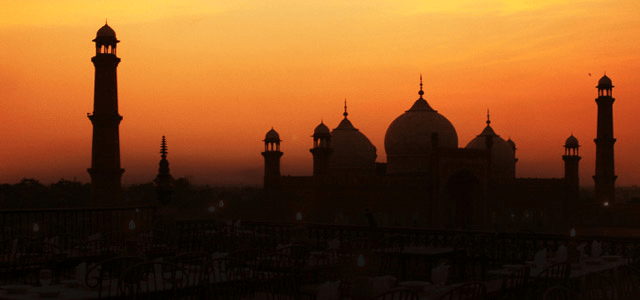
Overwhelming percentages of Muslims in many countries want Islamic law (sharia) to be the official law of the land, according to a worldwide survey by the Pew Research Center. But many supporters of sharia say it should apply only to their country’s Muslim population.
Moreover, Muslims are not equally comfortable with all aspects of sharia: While most favor using religious law in family and property disputes, fewer support the application of severe punishments – such as whippings or cutting off hands – in criminal cases. The survey also shows that Muslims differ widely in how they interpret certain aspects of sharia, including whether divorce and family planning are morally acceptable.
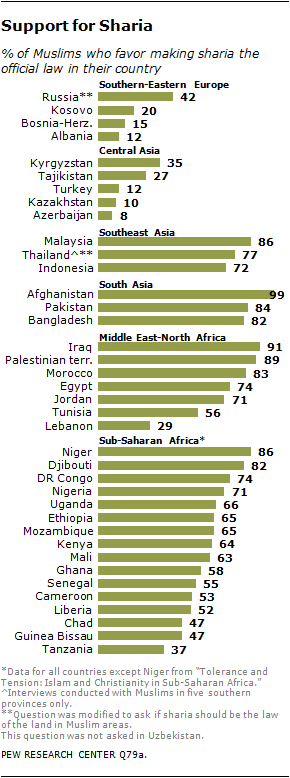

The survey involved a total of more than 38,000 face-to-face interviews in 80-plus languages. It covered Muslims in 39 countries, which are divided into six regions in this report – Southern and Eastern Europe (Russia and the Balkans), Central Asia, Southeast Asia, South Asia, the Middle East and North Africa, and sub-Saharan Africa.
Regional Differences
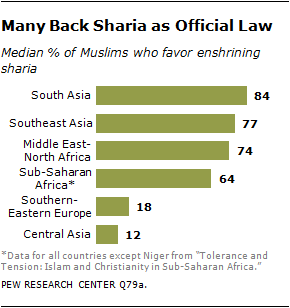

Attitudes toward Islamic law vary significantly by region. Support for making sharia the law of the land is highest in South Asia (median of 84%). Medians of at least six-in-ten Muslims in sub-Saharan Africa (64%), the Middle East-North Africa region (74%) and Southeast Asia (77%) also favor enshrining sharia as official law. But in two regions, far fewer Muslims say Islamic law should be endorsed by their governments: Southern and Eastern Europe (18%) and Central Asia (12%).
Within regions, support for enshrining sharia as official law is particularly high in some countries with predominantly Muslim populations, such as Afghanistan and Iraq.1 But support for sharia is not limited to countries where Muslims make up a majority of the population. In sub-Saharan Africa, for example, Muslims constitute less than a fifth of the population in Cameroon, the Democratic Republic of the Congo, Ghana, Kenya, Liberia, Mozambique and Uganda; yet in each of these countries, at least half of Muslims (52%-74%) say they want sharia to be the official law of the land.
Conversely, in some countries where Muslims make up more than 90% of the population, relatively few want their government to codify Islamic law; this is the case in Tajikistan (27%), Turkey (12%) and Azerbaijan (8%).
Distinct legal and political cultures may help to explain the differing levels of support for sharia. Many of the countries surveyed in Central Asia and Southern and Eastern Europe share a history of separating religion and the state. The policies of modern Turkey’s founding father, Mustafa Kemal Ataturk, for example, emphasized the creation of a secular government; other countries in these two regions experienced decades of secularization under communist rule. By contrast, governments in many of the countries surveyed in South Asia and the Middle East-North Africa region have officially embraced Islam.
Sharia
Sharia, or Islamic law, offers moral and legal guidance for nearly all aspects of life – from marriage and divorce, to inheritance and contracts, to criminal punishments. Sharia, in its broadest definition, refers to the ethical principles set down in Islam’s holy book (the Quran) and examples of actions by the Prophet Muhammad (sunna). The Islamic jurisprudence that comes out of the human exercise of codifying and interpreting these principles is known as fiqh. Muslim scholars and jurists continue to debate the boundary between sharia and fiqh as well as other aspects of Islamic law.
Existing Legal Frameworks
Indeed, the survey finds that support for making sharia the law of the land is often higher in countries where the constitution or basic laws already favor Islam over other religions.2 Majorities in such countries say sharia should be enshrined as official law, including at least nine-in-ten Muslims in Afghanistan (99%) and Iraq (91%). By comparison, in countries where Islam is not legally favored, roughly a third or fewer Muslims say sharia should be the law of the land. Support is especially low in Kazakhstan (10%) and Azerbaijan (8%).3
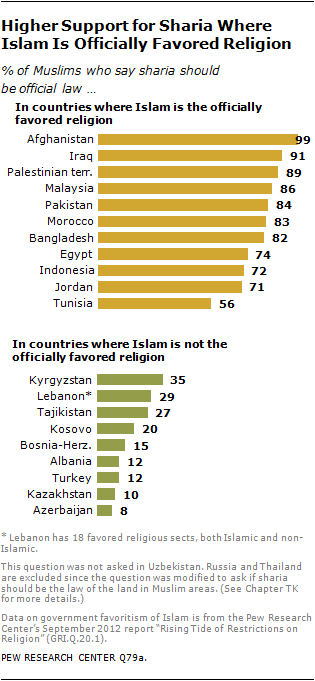

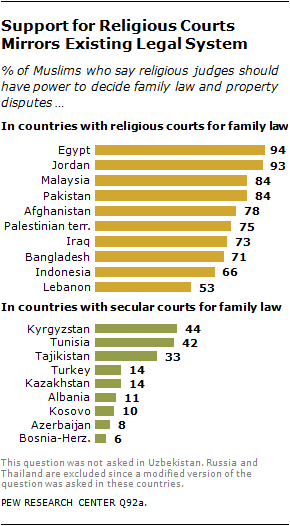

The survey also finds that views about instituting sharia in the domestic-civil sphere frequently mirror a country’s existing legal system. Asked whether religious judges should decide family and property disputes, at least half of Muslims living in countries that have religious family courts answer yes.4 By contrast, in countries where secular courts oversee family matters, fewer than half of Muslims think that family and property disputes should be within the purview of religious judges.
When comparing Muslim attitudes toward sharia as official law and its specific application in the domestic sphere, three countries are particularly instructive: Lebanon, Tunisia and Turkey.
In Lebanon, Islam is not the favored religion of the state, but the major Muslim sects in the country operate their own courts overseeing family law.5 Attitudes of Lebanese Muslims appear to mirror this political and legal structure: While roughly three-in-ten (29%) say sharia should be the official law of the land, about half (53%) say religious judges should have the power to decide family and property disputes.
Tunisia’s legal framework is, in key respects, the opposite of Lebanon’s: The Tunisian Constitution favors Islam over other religions, but religious courts, which once governed family law, were abolished in 1956.6 Perhaps reflecting this history, more than half of Tunisian Muslims (56%) want sharia to be the official law of the land, but a minority (42%) says religious courts should oversee family and property law.
Turkey’s evolution in the early 20th century included sweeping legal reforms resulting in a secular constitution and legal framework. As part of these changes, traditional sharia courts were eliminated in the 1920s.7 Today, only minorities of Turkish Muslims back enshrining sharia as official law (12%) or letting religious judges decide family and property disputes (14%).
Religious Commitment and Support for Sharia
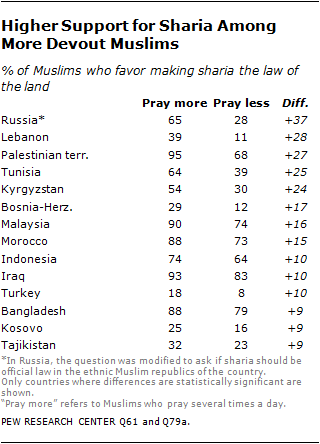

The survey finds that religious devotion also shapes attitudes toward sharia.8 In many countries, Muslims with higher levels of religious commitment are more likely to support sharia. In Russia, for example, Muslims who say they pray several times a day are 37 percentage points more likely to support making sharia official law than Muslims who say they pray less frequently. Similarly, in Lebanon, the Palestinian territories and Tunisia, Muslims who say they pray several times a day are at least 25 percentage points more supportive of enshrining sharia as official law than are less observant Muslims.
Age, Gender, Education and Support for Sharia
Across the countries surveyed, support for making sharia the official law of the land generally varies little by age, gender or education. In the few countries where support for Islamic law varies significantly by age, older Muslims tend to favor enshrining sharia as the law of the land more than younger Muslims do. This is particularly true in the Middle East-North Africa region, where Muslims ages 35 and older are more likely than those 18-34 to back sharia in Lebanon (+22 percentage points), Jordan (+12), Tunisia (+12) and the Palestinian territories (+10).
In only two countries are men significantly more likely than women to favor enshrining sharia as official law: Pakistan (+16 percentage points) and Russia (+9). In most countries, Muslims with a secondary degree or higher (i.e., graduates of a high school, technical institute or college) are about as likely as those with less education to support Islamic law.
Muslims Who Favor Making Sharia Official Law
When Muslims around the world say they want sharia to be the law of the land, what role do they envision for religious law in their country? First, many, but by no means all, supporters of sharia believe the law of Islam should apply only to Muslims. In addition, those who favor Islamic law tend to be most comfortable with its application to questions of family and property.9 In some regions, fewer back the imposition of severe punishments in criminal cases, such as cutting off the hands of thieves – an area of sharia known in Arabic as hudud (see Glossary). But in South Asia and the Middle East and North Africa, medians of more than half back both severe criminal punishments and the death penalty for Muslims who renounce their faith.


Muslims who favor making sharia the law of the land generally agree that the requirements of Islam should apply only to Muslims. Across the regions where the question was asked, medians of at least 51% say sharia should apply exclusively to adherents of the Muslim faith. This view is prevalent even in regions such as South Asia, Southeast Asia and the Middle East and North Africa, where there is overwhelming support for enshrining sharia as the official law of the land. (See chart in Should Sharia Apply to All Citizens? in Chapter 1: Beliefs About Sharia.)
At the country level, there are notable exceptions to the view that sharia should apply only to Muslims. These include Egypt, where 74% of Muslims say sharia should be the law of the land and nearly three-quarters of them (or 55% of all Egyptian Muslims) say Islamic law should apply to people of all faiths.
Sharia supporters around the world widely agree that Muslim leaders and religious judges should decide family and property disputes. The median percentage of sharia supporters who favor applying religious law in the domestic sphere is highest in Southeast Asia (84%), followed by South Asia (78%), the Middle East and North Africa (78%), and Central Asia (62%). In Southern and Eastern Europe, fewer (41%) think religious judges should oversee family and property issues. (See chart in How Should Sharia Be Applied? in Chapter 1: Beliefs About Sharia.)
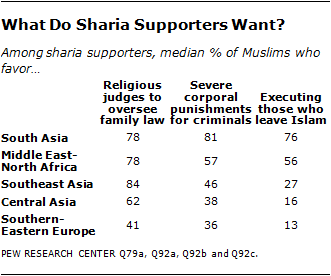

In South Asia, support for applying religious law to family and property disputes is coupled with strong backing for severe criminal punishments, such as cutting off the hands of thieves (median of 81%) and the death penalty for Muslims who renounce their faith (76%). In the Middle East-North Africa region, medians of more than half favor strict criminal penalties (57%) and the execution of those who convert from Islam to another faith (56%).
By contrast, fewer Muslims back severe criminal punishments in Southeast Asia (median of 46%), Central Asia (38%), and Southern and Eastern Europe (36%). Even smaller medians in these same regions (between 13% and 27%) say apostates should face the death penalty for leaving Islam to join another religion. (For more details on views toward apostasy, see How Should Sharia Be Applied? in Chapter 1: Beliefs About Sharia.)
What is a Median?
The median is the middle number in a list of numbers sorted from highest to lowest. On many questions in this report, medians are reported for groups of countries to help readers see regional patterns.
For a region with an odd number of countries, the median on a particular question is the middle spot among the countries surveyed in that region. For regions with an even number of countries, the median is computed as the average of the two countries at the middle of the list (e.g., where six nations are shown, the median is the average of the third and fourth countries listed in the region).
Faith and Morality
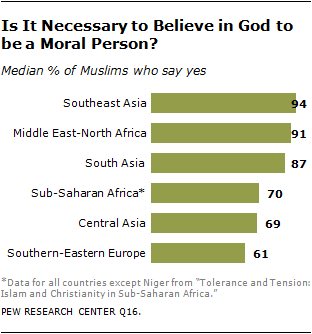

Regardless of whether they support making sharia the official law of the land, Muslims around the world overwhelmingly agree that in order for a person to be moral, he or she must believe in God. Muslims across all the regions surveyed also generally agree that certain behaviors – such as suicide, homosexuality and consuming alcohol – are morally unacceptable. However, Muslims are less unified when it comes to the morality of divorce, birth control and polygamy. Even Muslims who want to enshrine sharia as the official law of the land do not always line up on the same side of these issues.
The survey asked Muslims if it is necessary to believe in God to be moral and have good values. For the majority of Muslims, the answer is a clear yes. Median percentages of roughly seven-in-ten or more in Central Asia (69%), sub-Saharan Africa (70%), South Asia (87%), the Middle East-North Africa region (91%) and Southeast Asia (94%) agree that morality begins with faith in God. In Southern and Eastern Europe, where secular traditions tend to be strongest, a median of 61% agree that being moral and having good values depend on belief in God.10 In only two of the 38 countries where the question was asked – Albania (45%) and Kazakhstan (41%) – do fewer than half of Muslims link morality to faith in God. (The question was not asked in Afghanistan.)
Muslims around the world also share similar views about the immorality of some behaviors. For example, across the six regions surveyed, median percentages of roughly eight-in-ten or more consistently say prostitution, homosexuality and suicide are morally wrong. Medians of at least 60% also condemn sex outside marriage, drinking alcohol, abortion and euthanasia.
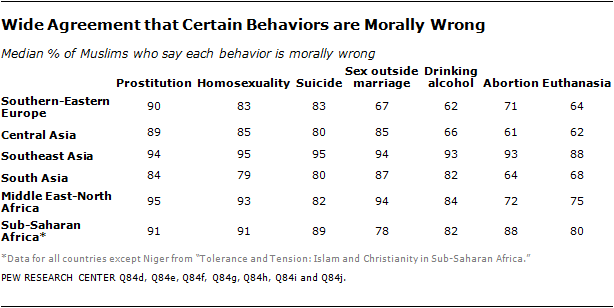

Moral attitudes are less uniform when it comes to questions of polygamy, divorce and family planning. In the case of polygamy, only in Southern and Eastern Europe (median of 68%) and Central Asia (62%) do most say that the practice of taking multiple wives is morally unacceptable. In the other regions surveyed, attitudes toward polygamy vary widely from country to country. For example, in the Middle East-North Africa region, the percentage of Muslims who think polygamy is morally unacceptable ranges from 6% in Jordan to 67% in Tunisia. Similarly, in sub-Saharan Africa, as few as 5% of Muslims in Niger say plural marriage is morally wrong, compared with 59% who hold this view in Mozambique.
In sub-Saharan Africa, a median of 51% explicitly describe divorce as morally wrong. In other regions, fewer share this view, although opinions vary substantially at the country level. Many Muslims say that divorce is either not a moral issue or that the morality of ending a marriage depends on the situation. In the Middle East and North Africa, for instance, more than a quarter of Muslims in five of the six countries where the question was asked say either that divorce is not a moral issue or that it depends on the context.
Muslims also are divided when it comes to the morality of birth control. In most countries where the question was asked, there was neither a clear majority saying family planning is morally acceptable nor a clear majority saying it is morally wrong. Rather, many Muslims around the world say that a married couple’s decision to limit pregnancies either is not a moral issue or depends on the situation; this includes medians of at least a quarter in Central Asia (27%), Southern and Eastern Europe (30%) and the Middle East-North Africa region (41%).
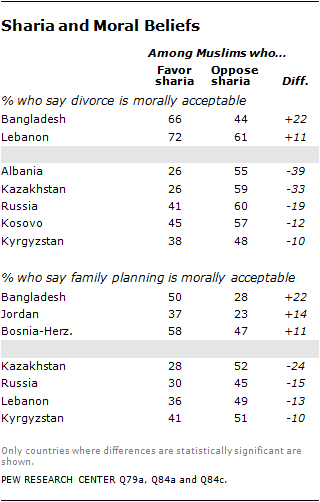

In addition, the survey finds that sharia supporters in different countries do not necessarily have the same views on the morality of divorce and family planning. For example, in Bangladesh and Lebanon, supporters of sharia are at least 11 percentage points more likely than other Muslims to say divorce is morally acceptable. But in Albania, Kazakhstan, Russia, Kosovo and Kyrgyzstan, those who want sharia to be official law are less likely than other Muslims to characterize divorce as morally acceptable. Sharia supporters in different countries also diverge in their attitudes toward family planning. In Bangladesh, Jordan and Bosnia-Herzegovina, Muslims who want to enshrine sharia as the law of land are more likely to say family planning is moral, while in Kazakhstan, Russia, Lebanon and Kyrgyzstan, supporters of sharia are less likely to say limiting pregnancies is morally acceptable. (For more details on views toward polygamy, divorce and family planning, see Morality and Marriage in Chapter 3: Morality.)
Women’s Rights
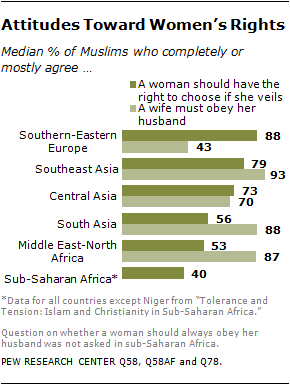

Muslims’ attitudes toward women’s rights are mixed. In most parts of the world, Muslims say that a woman should be able to decide whether to wear a veil. Yet when it comes to private life, most Muslims say a wife should always obey her husband. There is considerable disagreement over whether a wife should be able to initiate a divorce and whether a daughter should be able to receive an inheritance equal to a son’s.
Across five of the six major regions included in the study, majorities of Muslims in most countries say a woman should be able to decide for herself whether to wear a veil in public. Medians of roughly seven-in-ten or more take this view in Southern and Eastern Europe (88%), Southeast Asia (79%) and Central Asia (73%). But fewer say women should have this right in South Asia (56%) and the Middle East-North Africa region (53%). Sub-Saharan Africa is the only region where a median of less than half (40%) think a woman should be able to decide for herself whether to wear a veil. (For more details on views toward veiling, see Women and Veiling in Chapter 4: Women In Society.)
Although many Muslims endorse a woman’s right to choose how she appears in public, overwhelming majorities in most regions say a wife should always obey her husband. Medians of more than eight-in-ten Muslims express this view in Southeast Asia (93%), South Asia (88%), and the Middle East and North Africa (87%). Even in Central Asia, a region characterized by relatively low levels of religious observance and strong support for a woman’s right to decide whether to wear a veil, seven-in-ten Muslims agree that a wife should carry out her husband’s wishes.11 Only in Southern and Eastern Europe do fewer than half (median of 43%) share this view.
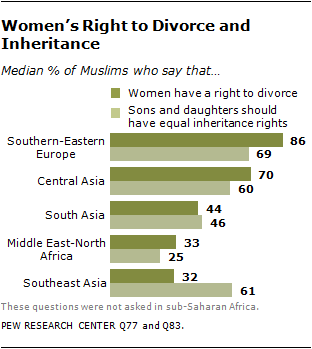

Views on a women’s rights to divorce and inheritance vary considerably across the regions surveyed. Muslims in Southern and Eastern Europe and Central Asia clearly support a wife’s right to initiate a divorce (regional medians of 86% and 70%, respectively). However, fewer in the other regions think this should be a woman’s prerogative. Similarly, medians of six-in-ten or more in three regions – Southern and Eastern Europe (69%), Southeast Asia (61%) and Central Asia (60%) – think daughters and sons should have equal inheritance rights. But far fewer agree in South Asia (46%) and the Middle East-North Africa region (25%).
As in the case of support for religious courts and making sharia official law, attitudes toward equal inheritance appear to reflect, at least in part, a society’s legal and social norms. For example, at least three-quarters of Muslims say children should be able to inherit equally, regardless of gender, in Turkey (88%), Bosnia-Herzegovina (79%) and Kosovo (76%) – all countries where laws do not require that sons should receive greater inheritance than daughters. By contrast, in Jordan (25%), Iraq (22%), Morocco (15%) and Tunisia (15%) – countries where laws specify unequal inheritance based on gender – a quarter or fewer say daughters and sons should have equal rights to their family’s wealth. (See Inheritance Rights for Women in Chapter 4: Women In Society.)
Differences in Views by Gender
Overall, the survey finds that Muslim women are often, but not always, more supportive of women’s rights.12 For example, in about half of the 39 countries surveyed, women are more likely than men to say that a woman should decide for herself whether to wear a veil in public. Yet in the remaining countries, women are just as likely as men to say that the question of veiling should not be left to individual women. When it comes to divorce and equal inheritance, there are even fewer countries where Muslim women are significantly more supportive of women’s rights than are Muslim men.
Extremism Widely Rejected
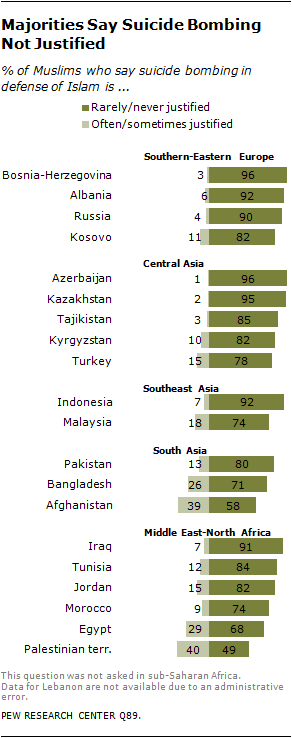

Muslims around the world strongly reject violence in the name of Islam. Asked specifically about suicide bombing, clear majorities in most countries say such acts are rarely or never justified as a means of defending Islam from its enemies.
In most countries where the question was asked, roughly three-quarters or more Muslims reject suicide bombing and other forms of violence against civilians. And in most countries, the prevailing view is that such acts are never justified as a means of defending Islam from its enemies. Yet there are some countries in which substantial minorities think violence against civilians is at least sometimes justified. This view is particularly widespread among Muslims in the Palestinian territories (40%), Afghanistan (39%), Egypt (29%) and Bangladesh (26%).
The survey finds little evidence that attitudes toward violence in the name of Islam are linked to factors such as age, gender or education. Similarly, the survey finds no consistent link between support for enshrining sharia as official law and attitudes toward religiously motivated violence. In only three of the 15 countries with sufficient samples sizes for analysis – Egypt, Kosovo and Tunisia – are sharia supporters significantly more likely to say suicide bombing and other forms of violence are at least sometimes justified. In Bangladesh, sharia supporters are significantly less likely to hold this view.
In a majority of countries surveyed, at least half of Muslims say they are somewhat or very concerned about religious extremism. And on balance, more Muslims are concerned about Islamic than Christian extremist groups. In all but one of the 36 countries where the question was asked, no more than one-in-five Muslims express worries about Christian extremism, compared with 28 countries where at least that many say they are concerned about Islamic extremist groups. This includes six countries in which 40% or more of Muslims worry about Islamic extremism: Guinea Bissau (54%), Indonesia (53%), Kazakhstan (46%), Iraq (45%), Ghana (45%) and Pakistan (40%). (For more details on views toward extremism, see Concern About Religious Extremism in Chapter 2: Religion and Politics.)
Few See Tensions Over Religious Differences
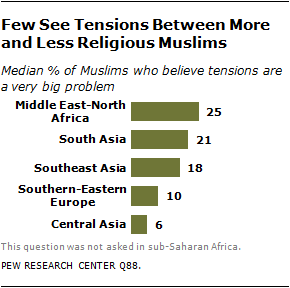

Although many Muslims are concerned about Islamic extremist groups, relatively few think tensions between more and less observant Muslims pose a major problem for their country. Similarly, most do not see Sunni-Shia hostilities as a major problem. And when asked specifically about relations between Muslims and Christians, majorities in most countries see little hostility between members of the two faiths.
Muslims in Southern and Eastern Europe and those in Central Asia are not as likely as those in other regions to describe tensions between more religious and less religious Muslims as a very big problem in their country (regional medians of 10% and 6%, respectively). Slightly more Muslims in South Asia (21%) and Southeast Asia (18%) see intra-faith differences as a major problem. In the Middle East and North Africa, a median of one-in-four say tensions between more and less devout Muslims is a pressing issue in their country.
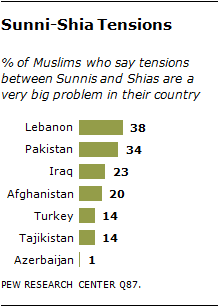

Across the seven countries where the question was asked, fewer than four-in-ten Muslims consider tensions between Sunnis and Shias to be a major national problem. However, levels of concern vary considerably. At one end of the spectrum, barely any Muslims in Azerbaijan (1%) say Sunni-Shia tensions are a pressing issue in their country. By contrast, in Lebanon (38%), Pakistan (34%) and Iraq (23%) – three countries that have experienced sectarian violence – about a quarter or more view Sunni-Shia tensions as a very big problem. (For more details on Sunni-Shia tensions, see Concern About Sunni-Shia Conflict in Chapter 5: Relations Among Muslims.)
Compared with issues such as unemployment and crime, which majorities often describe as pressing issues in their country, relatively few Muslims place religious conflict among their nation’s top problems. Regional medians of one-in-five or fewer characterize such conflict as a major issue in Southern and Eastern Europe (20%) and Central Asia (12%). Somewhat larger medians describe religious tensions as a pressing problem in South Asia (35%), sub-Saharan Africa (34%) and Southeast Asia (27%). Only in the Middle East-North Africa region does a median of 50% say religiously based conflict is a major problem facing their country.
The survey asked in particular about relations between Muslims and Christians. In nearly all countries, fewer than half of Muslims say that many or most members of either religious group are hostile toward the other group. In five countries, however, more than three-in-ten Muslims describe many or most Christians as antagonistic toward Muslims: Egypt (50%), Guinea Bissau (41%), the Democratic Republic of the Congo (37%), Chad (34%) and Bosnia-Herzegovina (31%). And in three countries similar percentages say many or most Muslims are hostile toward Christians: Guinea Bissau (49%), Chad (38%) and Egypt (35%). (For more details on Muslim-Christian tensions, see Views of Muslim-Christian Hostilities in Chapter 6: Interfaith Relations.)
Democracy and Religious Freedom
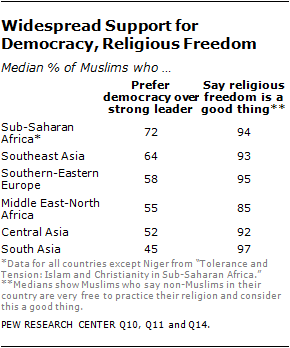

Most Muslims around the world express support for democracy, and most say it is a good thing when others are very free to practice their religion. At the same time, many Muslims want religious leaders to have at least some influence in political matters.
Given a choice between a leader with a strong hand or a democratic system of government, most Muslims choose democracy. Regional medians of roughly six-in-ten or more support democracy in sub-Saharan Africa (72%), Southeast Asia (64%) and Southern and Eastern Europe (58%), while slightly fewer agree in the Middle East and North Africa (55%) and Central Asia (52%). Muslims in South Asia are the most skeptical of democratic government (a median of 45% say they support democracy).
A majority of Muslims in most countries surveyed say they are “very free” to practice their religion. The only countries where fewer than half of Muslims say they are very free to practice their faith are Iraq (48%), Egypt (46%) and Uzbekistan (39%).
The survey also asked Muslims whether people of other faiths in their country are very free, somewhat free, not too free or not at all free to practice their religion; a follow-up question asked Muslims whether they consider this “a good thing” or “a bad thing.” In 31 of the 38 countries where the question was asked, majorities of Muslims say people of other faiths can practice their religion very freely. (The question was not asked in Afghanistan.) And of those who share this assessment, overwhelming majorities consider it a good thing. This includes median percentages of more than nine-in-ten in South Asia (97%), Southern and Eastern Europe (95%), sub-Saharan Africa (94%), Southeast Asia (93%) and Central Asia (92%). In the Middle East-North Africa region, nearly as many (85%) share this view.
There are a few countries where 10% or more of Muslims say non-Muslims are either “not too free” or “not at all free” to practice their faith. These include Egypt (18%), Turkey (14%), Iraq (13%), Djibouti (11%), Tajikistan (11%) and the Palestinian territories (10%). Very few Muslims in these countries call this lack of religious freedom “a good thing.” Egypt is the only country in which more than one-tenth (12%) of the total Muslim population says it is a good thing that non-Muslims are not free to practice their faith.
Islam and Politics
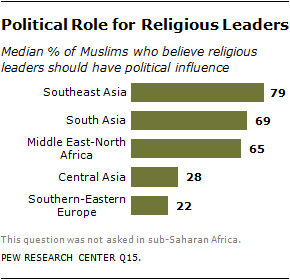

While Muslims widely embrace democracy and religious freedom, many also want religion to play a prominent role in politics. Medians of at least six-in-ten in Southeast Asia (79%), South Asia (69%), and the Middle East and North Africa (65%) say religious leaders should have at least some influence over political matters. This includes medians of at least a quarter across these three regions who would like to see religious leaders exert a large influence on politics. Muslims in the other two regions where the question was asked are less comfortable with the merger of politics and faith. Fewer than three-in-ten Muslims in Central Asia (28%) and Southern and Eastern Europe (22%) say religious leaders should wield influence in political matters. And among these, less than one-in-ten think religion should have a large influence.
Devout Muslims tend to be more supportive of religious leaders playing a role in politics. In a number of countries, particularly in the Middle East and North Africa but also in Southern and Eastern Europe, Muslims who pray several times a day are more likely than those who pray less frequently to say religious leaders should have at least some influence on political matters. At a country level, this gap is especially wide in Lebanon, where Muslims who pray several times a day are nearly four times more likely than other Muslims (51% vs. 13%) to say religious leaders should play a role in politics.
Islam and Contemporary Society
Most Muslims are comfortable practicing their faith in the contemporary world. Relatively few feel there is an inherent conflict between being religiously devout and living in a modern society, and the prevailing view in most countries surveyed is that there is no inherent conflict between religion and science. However, most Muslims think Western music, movies and television pose a threat to morality in their country – even though, on a personal level, substantial percentages say they enjoy Western entertainment.
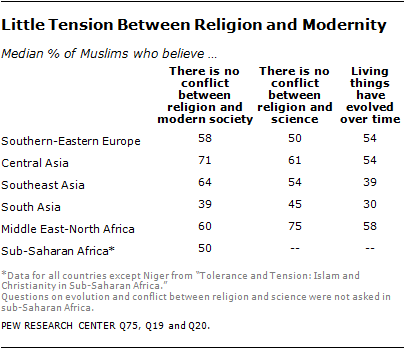

Across the six major regions included in the study, most Muslims reject the notion that there is an inherent tension between modern society and leading a religiously devout life. This view prevails in regions characterized by low levels of religious observance – Central Asia (median of 71%) and Southern and Eastern Europe (58%) – as well as in regions where most Muslims are highly observant – Southeast Asia (64%) and the Middle East and North Africa (60%).13 Muslims in sub-Saharan Africa are more divided on the compatibility of religion and modern life (median of 50%). Muslims in South Asia, meanwhile, are less likely to say modern life and religious devotion are compatible (median of 39%). (For more details, see Religion and Modernity in Chapter 7: Religion, Science and Popular Culture.)
Across the 23 countries where the question was asked, most Muslims see no inherent conflict between religion and science. This view is especially widespread in the Middle East and North Africa (median of 75%) even though, as previously noted, many Muslims in the region are highly committed to their faith. Across the other regions surveyed, medians of 50% or more concur that religion and science are compatible. The one exception is South Asia, where fewer than half (45%) share this view.
Asked specifically about the origins of humans and other living things, Muslims in Central Asia, Southern and Eastern Europe, and the Middle East-North Africa region agree with the theory of evolution (regional medians from 54% to 58%). Fewer Muslims accept evolution in Southeast Asia (39%) and South Asia (30%). (For more details on views toward evolution, see Evolution in Chapter 7: Religion, Science and Popular Culture.)
Western Pop Culture
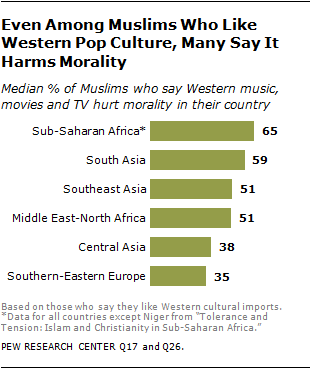

Western music, movies and television have become a fixture of contemporary society in many parts of the world. The survey finds that, at a personal level, many Muslims enjoy Western popular culture. This is especially true in Southern and Eastern Europe (66%), Central Asia (52%) and sub-Saharan Africa (51%), where medians of at least 50% say they like Western entertainment. Fewer in Southeast Asia (41%) and the Middle East and North Africa (38%) share this view. Favorable opinions of Western music, movies and television are even rarer in South Asia (25%).
Even though many Muslims enjoy Western pop culture, a clear majority of Muslims in most countries surveyed think that Western entertainment harms morality in their country. And it is not only Muslims who personally dislike Western music, movies and television who feel this way. In four of the six regions, medians of at least half of those who say they enjoy this type of entertainment also say Western cultural imports undermine morality: sub-Saharan Africa (65%), South Asia (59%), Southeast Asia (51%) and the Middle East-North Africa region (51%). (For more details, including Muslims’ views toward Bollywood, see Popular Culture in Chapter 7: Religion, Science and Popular Culture.)
How Do American Muslims Compare?
In 2011, the Pew Research Center conducted its second nationally representative survey of Muslims in the United States. When that survey is compared with the global survey of Muslims, some key differences emerge between U.S. Muslims and Muslims in other countries. In general, American Muslims are more at ease in the contemporary world. About six-in-ten Muslims living in the U.S. (63%) say there is no tension between being religiously devout and living in a modern society, compared with a median of 54% of Muslims worldwide. American Muslims also are more likely than Muslims in other parts of the world to say that many religions can lead to eternal salvation (56% vs. global median of 18%). Additionally, U.S. Muslims are much less likely than Muslims worldwide to say that all or most of their close friends are Muslim (48% vs. global median of 95%).
Muslims in the U.S. are about as likely as Muslims in other countries to view science and religion as fully compatible. In the U.S., 59% of Muslims say there generally is not a conflict between science and religion, compared with a median of 54% globally among Muslims. However, American Muslims are somewhat less likely to believe in evolution than are Muslims in other parts of the world (45% vs. global median of 53%). Indeed, when it comes to evolution, U.S. Muslims are closer to U.S. Christians (46% of whom say they believe in evolution) than they are to fellow Muslims elsewhere in the world.
American Muslims are even more likely than Muslims in other countries to firmly reject violence in the name of Islam. In the U.S., about eight-in-ten Muslims (81%) say that suicide bombing and similar acts targeting civilians are never justified. Across the globe, a median of roughly seven-in-ten Muslims (72%) agrees. (For more details on how U.S. Muslims compare with Muslims worldwide, see Appendix A: U.S. Muslims — Views on Religion and Society in a Global Context.)
About the Report
These and other findings are discussed in more detail in the remainder of this report, which is divided into seven chapters:
This report also includes an appendix with comparable results from past Pew Research Center surveys of Muslims in the United States. A glossary of key terms can be found here. The survey questionnaire and a topline with full results are available as a PDF. The online version of the report also includes an infographic. This report covers attitudes and views on a variety of social and political questions. A previous Pew Research report, released in August 2012, addressed religious affiliation, beliefs and practices among Muslims.
This report includes data on every nation with a Muslim population of more than 10 million except Algeria, China, India, Iran, Saudi Arabia, Sudan, Syria and Yemen. Together, the 39 countries and territories included in the survey are home to about two-thirds of all Muslims in the world.
The surveys that are the basis for this report were conducted across multiple years. Fifteen sub-Saharan countries with substantial Muslim populations were surveyed in 2008-2009 as part of a larger project that examined religion in that region. The methods employed in those countries – as well as some of the findings – are detailed in the Pew Research Center’s 2010 report “Tolerance and Tension: Islam and Christianity in Sub-Saharan Africa.” An additional 24 countries and territories were surveyed in 2011-2012. In 21 of these countries, Muslims make up a majority of the population. In these cases, nationally representative samples of at least 1,000 respondents were fielded. The number of self-identified Muslims interviewed in these countries ranged from 551 in Lebanon to 1,918 in Bangladesh. In Russia and Bosnia-Herzegovina, where Muslims are a minority, oversamples were employed to ensure adequate representation of Muslims; in both cases, at least 1,000 Muslims were interviewed. Meanwhile, in Thailand, the survey was limited to the country’s five southern provinces, each with substantial Muslim populations; more than 1,000 interviews with Muslims were conducted across these provinces. Appendix C provides greater detail on the 2011-2012 survey’s methodology.


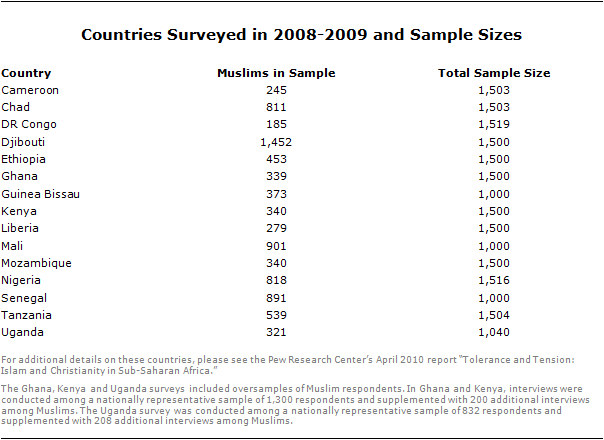

Footnotes:
1 The populations of both Afghanistan and Iraq are at least 99% Muslim. Estimates for the religious composition of countries in this report are from the Pew Research Center’s December 2012 report “The Global Religious Landscape.” (return to text)
2 The designation “officially favored religion” is based on the Pew Research Center’s September 2012 report “Rising Tide of Restrictions on Religion.” See 2010 data for question in Government Restrictions Index on whether a country’s constitution or basic law recognizes a favored religion (GRI.Q.20.1). For analysis of support for sharia among Muslims in sub-Saharan Africa, see the Pew Research Center’s April 2010 report “Tolerance and Tension: Islam and Christianity in Sub-Saharan Africa.”(return to text)
3 Whether a country’s legal system shapes, or is shaped by, public opinion is beyond the scope of this study. This report is not asserting a causal relationship in either direction. (return to text)
4 Information on countries that have religious family courts is from Stahnke, Tad and Robert C. Blitt. 2005. “The Religion-State Relationship and the Right to Freedom of Religion or Belief: A Comparative Textual Analysis of the Constitutions of Predominantly Muslim Countries.” Georgetown Journal of International Law, volume 36, issue 4; Emory Law School’s Islamic Family Law project; and University of Richmond’s Constitution Finder. (return to text)
5 See National Reconciliation Charter of Lebanon. 1989. Articles 1b and1j; and Abiad, Nisrine. 2008. “Sharia, Muslim States and International Human Rights Treaty Obligations: A Comparative Study.” British Institute of International and Comparative Law, page 56. (return to text)
6 See Constitution of Tunisia. 1959. Article 1; and Abiad, Nisrine. 2008. “Sharia, Muslim States and International Human Rights Treaty Obligations: A Comparative Study.” British Institute of International and Comparative Law, page 146. (return to text)
7 See Turkish Civil Code. 1926; Constitution of the Republic of Turkey. 1982. Part 3, Chapter 3, “Judiciary”; and Kocak, Mustafa. 2010. “Islam and National Law in Turkey.” In Otto, Jan Michiel, editor. “Sharia Incorporated: A Comparative Overview of the Legal Systems of Twelve Muslim Countries in Past and Present.” Leiden University Press, pages 231-272.(return to text)
8 For analysis of support for sharia among Muslims in sub-Saharan Africa, see the Pew Research Center’s April 2010 report “Tolerance and Tension: Islam and Christianity in Sub-Saharan Africa.” (return to text)
9 For analysis of support for sharia among Muslims in sub-Saharan Africa, see the Pew Research Center’s April 2010 report “Tolerance and Tension: Islam and Christianity in Sub-Saharan Africa.” (return to text)
10 For analysis of religious observance among Muslims around the world, see the Pew Research Center’s August 2012 report “The World’s Muslims: Unity and Diversity.” (return to text)
11 For background on levels of religious observance in the countries surveyed, see the Pew Research Center’s August 2012 report “The World’s Muslims: Unity and Diversity.” (return to text)
12 For analysis of support for women’s rights among Muslims in sub-Saharan Africa see the Pew Research Center’s April 2010 report “Tolerance and Tension: Islam and Christianity in Sub-Saharan Africa.” (return to text)
13 For background on levels of religious observance in the countries surveyed, see the Pew Research Center’s August 2012 report “The World’s Muslims: Unity and Diversity.” (return to text)
Photo Credit: © Scott E Barbour

